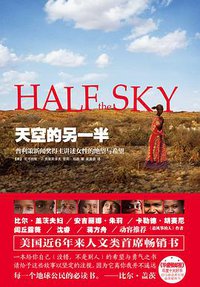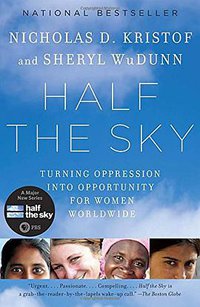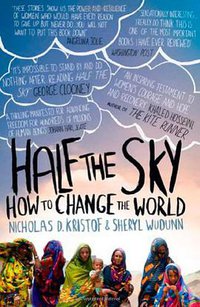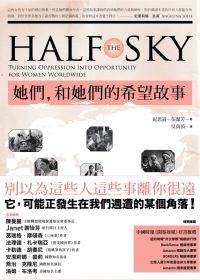Half the Sky
豆瓣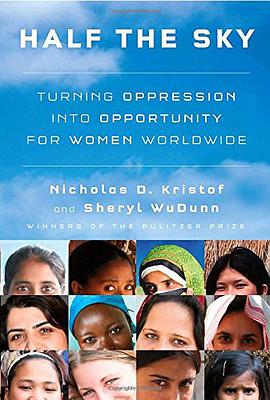
Turning Oppression into Opportunity for Women Worldwide
Nicholas D. Kristof / Sheryl WuDunn
简介
From The Washington Post
From The Washington Post's Book World/washingtonpost.com Reviewed by Carolyn See "Half the Sky" is either one of the most important books I have ever reviewed, or it is reportage about a will-o'-the-wisp movement destined to end up in the footnotes of history. Frankly, I'm too stunned by the density of information and the high quality of the prose here to know for sure which it is. You'll have to judge for yourselves. Nicholas D. Kristof and Sheryl WuDunn have been journalists for years. As a married couple, they covered the Tiananmen massacre and were appalled by the dramatic loss of human life. But as they continued their work in developing countries, they discovered that the most dreadful suffering happened in the daily lives of poor, mostly village women. Keep reading! This book isn't a sermon, and neither is this review. These Pulitzer Prize-winning authors see the treatment of women in developing countries as the great story of this century, a moral issue, sure, but also as an economic one. What if by oppressing half their population, countries in Africa, Asia and the Middle East have been shooting themselves in their collective foot? "Women hold up half the sky," the Chinese saying goes, and in fact -- the authors argue -- one of the reasons China has emerged as such an impressive power in the past decades may be because of the "Girl Effect," the millions of girls who have flocked to factories, sparking a revolution in that country. (Yes, those factories are no picnic, but they're better than the alternative: hobbling about on bound feet, as WuDunn's grandmother did.) But in other countries, women may be gang-raped if they leave the house; they're beaten daily, sold into brothels or married off as little children. They're stoned to death in the Middle East for infringements on the family honor or burned to death in India over dowry spats. Acid is thrown in their faces; they endure genital cutting and ghastly fistulas or internal ruptures from botched births. The authors handle this grim material by telling us just a handful of horrible stories at a time, based on their own extensive interviews. Then they leaven these sad tales with profiles of women who have endured rape, beatings or medical afflictions but have managed to found a school or a hospital or a small business that lifted them and those around them out of poverty and despair. These stories are electrifying and have the effect of breaking down this enormous problem into segments the reader can focus on. Suddenly, these horrendous problems begin to seem solvable. There's the story of the lowly Pakistani girl who was raped by men from a higher caste. They expected her to go home and kill herself, as was the custom in her village, but she applied for redress and caught the attention of then-President Pervez Musharraf, who sent her $8,300 in compensation. Instead of being eternally grateful and shutting up, she started a school, learning to read and write along with her students. The attention she brought to the issue of rape in Pakistan sent Musharraf into conniption fits, and she was hounded mercilessly by the government. But Musharraf is gone now, and the school still thrives. Kristof and WuDunn also tell of a girl in Ethiopia who suffered a fistula during her first pregnancy. She made her way to the Addis Ababa Fistula Hospital, got sewn up so she was no longer a "modern-day leper," and then stayed around to make beds and assist the surgeon. Eventually, she learned to do fistula operations herself. She's still learning to read and write, but elite surgeons now learn medical techniques from her. Big governments and big charities -- with the exception of CARE, which has recently focused its attention on girls and women -- are seen only faintly in these pages. The authors tend to focus instead on individual Westerners who had an "aha" moment, from distinguished public health physicians to high school girls who learned something about the situation and felt they had to help. The authors call them "social entrepreneurs" and admire them greatly. But they chide American feminists for being more interested in Title IX sports programs and inappropriate office touching than the plight of their sisters in the developing world. And they acknowledge that women are often implicated in institutionalized oppression, too. Again, this book is not a sermon about victims. Its range is wide, and sometimes it's even funny. In a wonderful, mordantly amusing chapter about big groups trying to impose their views on cultures they don't understand, the authors describe fundamentalist Christians trying as hard as they can to prevent contraception, and secular elites trying as hard as they can to advance it. But, as Kristof and WuDunn remind us, if you're down-and-out in a Congolese jungle, the Christian missionaries will be the ones there to provide you with food and medication. "Half the Sky" is a call to arms, a call for help, a call for contributions, but also a call for volunteers. It asks us to open our eyes to this enormous humanitarian issue. It does so with exquisitely crafted prose and sensationally interesting material. It provides us with a list of individual hospitals, schools and small charities so that we can contribute to, or at least inform ourselves about, this largely unknown world. I really do think this is one of the most important books I have ever reviewed. I may be wrong, but I don't think so.
Copyright 2009, The Washington Post. All Rights Reserved.
From Bookmarks Magazine
Critics, universally inspired by Half the Sky, used their reviews as an opportunity to take up its message. They praised not only Kristof and WuDunn's clear moral stance and explanation of the issues but also the way they combined individual women's stories and practical advice to give the book an optimistic tone. Reviewers pointed out some flaws, particularly the authors' focus on individual action (such as providing a list of hospitals and schools to direct charity to) while neglecting to criticize the policies of Western governments. As more than one reviewer pointed out, Saudi Arabia, a country with one of the worst records of oppressing women, is a U.S. ally. Nevertheless, critics encouraged readers to pick up Half the Sky, which, according to the Seattle Times, "will ignite a grass-roots revolution like the one that eliminated slavery."

